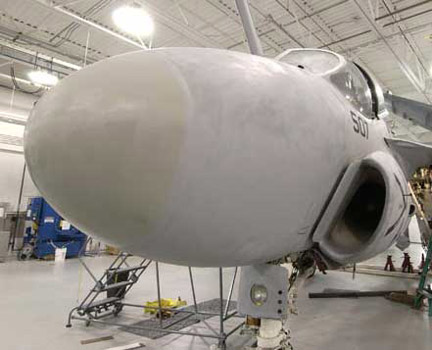RIT receives $2 million defense-department grant
Effort will enhance performance of airborne drones and surveillance aircraft
RIT's Center for Integrated Manufacturing Studies military research efforts have included work on numerous vehicles and systems including the U.S. Navy's A-6E Intruder, pictured above. United States Sens. Charles Schumer and Kirsten Gillibrand have announced $2 million additional funding for a project designed to improve the fleet of unmanned drones and surveillance aircraft used in Afghanistan.
United States Sens. Charles Schumer and Kirsten Gillibrand today announced that the Department of Defense appropriations bill includes $2 million for Rochester Institute of Technology to perform research for the U.S. military that will improve the current fleet of unmanned drones and surveillance aircraft that are currently being used in Afghanistan and other places around the world to combat terrorists and other enemies.
“Unmanned drones and surveillance aircraft have made a real difference for our men and women in the field and are on the frontlines of our national defense as we battle our terrorist enemies in Afghanistan and around the world,” Schumer says. “These federal dollars will go a long way toward keeping our troops out of harm’s way, and enhancing our national security by making sure terrorist cells around the world are disrupted or destroyed.”
“RIT is a world-class institution conducting cutting-edge research into unmanned surveillance and drones,” adds Gillibrand. “This critical investment will help save the lives of our men and women in uniform while enhancing our national security.”
“We are extremely grateful to Sens. Schumer and Gillibrand for their help in securing federal investment in this important research program,” notes RIT President Bill Destler. “It is our hope that this research will accelerate the implementation of new technologies that will support numerous military applications and improve our national security operations throughout the world.”
The Center for Integrated Manufacturing Studies, a component of RIT’s Golisano Institute for Sustainability, will use the federal funds to advance the capabilities of several military platforms including its Autonomous Systems program, unmanned drones and silent surveillance aircraft that are used extensively in Afghanistan.
The aircrafts often go into dangerous territories allowing service men and women to avoid unacceptable risk, keeping terrorist cells off base and gathering vital intelligence. Data gathered from unmanned aircrafts also helps troops directly in the field by gathering and disseminating information rapidly.
Last week, the appropriations bill for the Department of Defense passed the Defense subcommittee. The legislation will be voted on by the full committee before heading to the floor for a full vote before the Senate. The bill will then proceed to the House-Senate Conference Committee, before final passage in both chambers, and sent to the President to become law.






